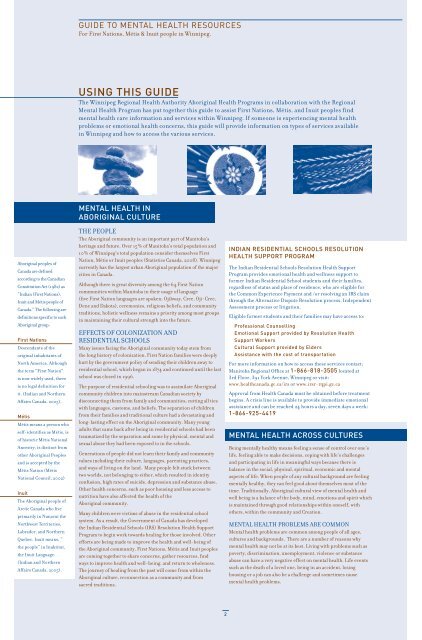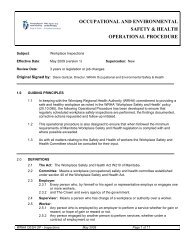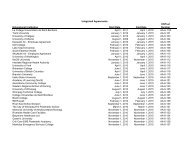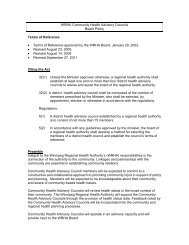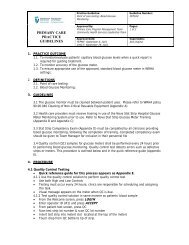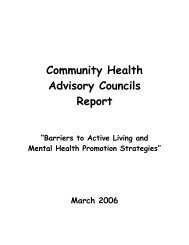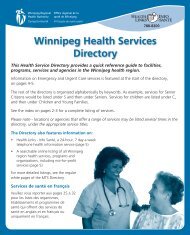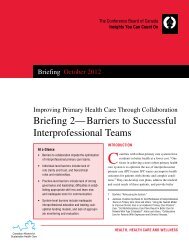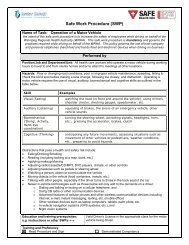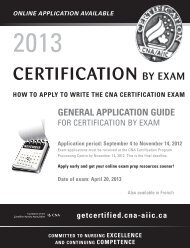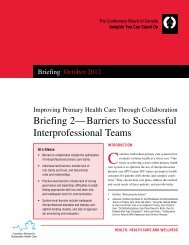The Culture of Well-being - Winnipeg Regional Health Authority
The Culture of Well-being - Winnipeg Regional Health Authority
The Culture of Well-being - Winnipeg Regional Health Authority
You also want an ePaper? Increase the reach of your titles
YUMPU automatically turns print PDFs into web optimized ePapers that Google loves.
GUIDE TO MENTAL HEALTH RESOURCES<br />
For First Nations, Métis & Inuit people in <strong>Winnipeg</strong>.<br />
Aboriginal peoples <strong>of</strong><br />
Canada are defined<br />
according to the Canadian<br />
Constitution Act (1982) as<br />
“Indian (First Nations),<br />
Inuit and Métis people <strong>of</strong><br />
Canada.” <strong>The</strong> following are<br />
definitions specific to each<br />
Aboriginal group:<br />
First Nations<br />
Descendants <strong>of</strong> the<br />
original inhabitants <strong>of</strong><br />
North America. Although<br />
the term “First Nation”<br />
is now widely used, there<br />
is no legal definition for<br />
it. (Indian and Northern<br />
Affairs Canada, 2005).<br />
Métis<br />
Métis means a person who<br />
self-identifies as Métis, is<br />
<strong>of</strong> historic Métis National<br />
Ancestry, is distinct from<br />
other Aboriginal Peoples<br />
and is accepted by the<br />
Métis Nation (Métis<br />
National Council, 2002)<br />
Inuit<br />
<strong>The</strong> Aboriginal people <strong>of</strong><br />
Arctic Canada who live<br />
primarily in Nunavut the<br />
Northwest Territories,<br />
Labrador, and Northern<br />
Quebec. Inuit means, “<br />
the people” in Inuktitut,<br />
the Inuit Language.<br />
(Indian and Northern<br />
Affairs Canada, 2005).<br />
USING THIS GUIDE<br />
<strong>The</strong> <strong>Winnipeg</strong> <strong>Regional</strong> <strong>Health</strong> <strong>Authority</strong> Aboriginal <strong>Health</strong> Programs in collaboration with the <strong>Regional</strong><br />
Mental <strong>Health</strong> Program has put together this guide to assist First Nations, Métis, and Inuit peoples find<br />
mental health care information and services within <strong>Winnipeg</strong>. If someone is experiencing mental health<br />
problems or emotional health concerns, this guide will provide information on types <strong>of</strong> services available<br />
in <strong>Winnipeg</strong> and how to access the various services.<br />
MENTAL HEALTH IN<br />
ABORIGINAL CULTURE<br />
THE PEOPLE<br />
<strong>The</strong> Aboriginal community is an important part <strong>of</strong> Manitoba’s<br />
heritage and future. Over 15% <strong>of</strong> Manitoba’s total population and<br />
10% <strong>of</strong> <strong>Winnipeg</strong>’s total population consider themselves First<br />
Nation, Métis or Inuit peoples (Statistics Canada, 2008). <strong>Winnipeg</strong><br />
currently has the largest urban Aboriginal population <strong>of</strong> the major<br />
cities in Canada.<br />
Although there is great diversity among the 64 First Nation<br />
communities within Manitoba in their usage <strong>of</strong> language<br />
(five First Nation languages are spoken: Ojibway, Cree, Oji-Cree,<br />
Dene and Dakota), ceremonies, religious beliefs, and community<br />
traditions, holistic wellness remains a priority among most groups<br />
in maintaining their cultural strength into the future.<br />
EFFECTS OF COLONIZATION AND<br />
RESIDENTIAL SCHOOLS<br />
Many issues facing the Aboriginal community today stem from<br />
the long history <strong>of</strong> colonization. First Nation families were deeply<br />
hurt by the government policy <strong>of</strong> sending their children away to<br />
residential school, which began in 1874 and continued until the last<br />
school was closed in 1996.<br />
<strong>The</strong> purpose <strong>of</strong> residential schooling was to assimilate Aboriginal<br />
community children into mainstream Canadian society by<br />
disconnecting them from family and communities; cutting all ties<br />
with languages, customs, and beliefs. <strong>The</strong> separation <strong>of</strong> children<br />
from their families and traditional culture had a devastating and<br />
long-lasting effect on the Aboriginal community. Many young<br />
adults that came back after <strong>being</strong> in residential schools had been<br />
traumatized by the separation and some by physical, mental and<br />
sexual abuse they had been exposed to in the schools.<br />
Generations <strong>of</strong> people did not learn their family and community<br />
values including their culture, languages, parenting practices,<br />
and ways <strong>of</strong> living on the land. Many people felt stuck between<br />
two worlds, not belonging to either, which resulted in identity<br />
confusion, high rates <strong>of</strong> suicide, depression and substance abuse.<br />
Other health concerns, such as poor housing and less access to<br />
nutrition have also affected the health <strong>of</strong> the<br />
Aboriginal community.<br />
Many children were victims <strong>of</strong> abuse in the residential school<br />
system. As a result, the Government <strong>of</strong> Canada has developed<br />
the Indian Residential Schools (IRS) Resolution <strong>Health</strong> Support<br />
Program to begin work towards healing for those involved. Other<br />
efforts are <strong>being</strong> made to improve the health and well-<strong>being</strong> <strong>of</strong><br />
the Aboriginal community. First Nations, Métis and Inuit peoples<br />
are coming together to share concerns, gather resources, find<br />
ways to improve health and well-<strong>being</strong>, and return to wholeness.<br />
<strong>The</strong> journey <strong>of</strong> healing from the past will come from within the<br />
Aboriginal culture, reconnection as a community and from<br />
sacred traditions.<br />
INDIAN RESIDENTIAL SCHOOLS RESOLUTION<br />
HEALTH SUPPORT PROGRAM<br />
<strong>The</strong> Indian Residential Schools Resolution <strong>Health</strong> Support<br />
Program provides emotional health and wellness support to<br />
former Indian Residential School students and their families,<br />
regardless <strong>of</strong> status and place <strong>of</strong> residence, who are eligible for<br />
the Common Experience Payment and /or resolving an IRS claim<br />
through the Alternative Dispute Resolution process, Independent<br />
Assessment process or litigation.<br />
Eligible former students and their families may have access to:<br />
Pr<strong>of</strong>essional Counselling<br />
Emotional Support provided by Resolution <strong>Health</strong><br />
Support Workers<br />
Cultural Support provided by Elders<br />
Assistance with the cost <strong>of</strong> transportation<br />
For more information on how to access these services contact:<br />
Manitoba <strong>Regional</strong> Office at 1-866-818-3505 located at<br />
3rd Floor, 391 York Avenue, <strong>Winnipeg</strong> or visit:<br />
www.healthcanada.gc.ca/irs or www.irsr-rqpi.gc.ca<br />
Approval from <strong>Health</strong> Canada must be obtained before treatment<br />
begins. A crisis line is available to provide immediate emotional<br />
assistance and can be reached 24 hours a day, seven days a week:<br />
1-866-925-4419<br />
MENTAL HEALTH ACROSS CULTURES<br />
Being mentally healthy means feeling a sense <strong>of</strong> control over one’s<br />
life, feeling able to make decisions, coping with life’s challenges<br />
and participating in life in meaningful ways because there is<br />
balance in the social, physical, spiritual, economic and mental<br />
aspects <strong>of</strong> life. When people <strong>of</strong> any cultural background are feeling<br />
mentally healthy, they can feel good about themselves most <strong>of</strong> the<br />
time. Traditionally, Aboriginal cultural view <strong>of</strong> mental health and<br />
well <strong>being</strong> is a balance <strong>of</strong> the body, mind, emotions and spirit which<br />
is maintained through good relationships within oneself, with<br />
others, within the community and Creation.<br />
MENTAL HEALTH PROBLEMS ARE COMMON<br />
Mental health problems are common among people <strong>of</strong> all ages,<br />
cultures and backgrounds. <strong>The</strong>re are a number <strong>of</strong> reasons why<br />
mental health may not be at its best. Living with problems such as<br />
poverty, discrimination, unemployment, violence or substance<br />
abuse can have a very negative effect on mental health. Life events<br />
such as the death <strong>of</strong> a loved one, <strong>being</strong> in an accident, losing<br />
housing or a job can also be a challenge and sometimes cause<br />
mental health problems.<br />
What is mental illness?<br />
All people have times <strong>of</strong> feeling down or sad, have trouble<br />
concentrating, talk out loud to themselves, or have a thought in<br />
mind and can’t get rid <strong>of</strong> it. <strong>The</strong>se things are normal.<br />
When a person is mentally ill, these kinds <strong>of</strong> feelings, thoughts and<br />
behaviors are extreme and get in the way <strong>of</strong> the person’s ability to go<br />
about their day.<br />
Many cultures do not use the words mental illness to describe when<br />
a person has emotional problems. Instead they may describe how a<br />
person has changed in mood, thoughts or behaviors, or changed in<br />
how he or she relates to others.<br />
Examples <strong>of</strong> some possible changes<br />
or problems in behavior:<br />
• Sleeping too much, or not able to sleep at all<br />
• Not keeping clean and cared for<br />
• Avoiding social contact and previously enjoyed activities<br />
• Laughing or crying inappropriately<br />
• Talking in ways that don’t make sense<br />
• Strange movements or behaviors (such as: talking<br />
out loud to no one; rigid or unusual body positions)<br />
• Unable to control behavior (such as: can’t stop<br />
walking back and forth; sudden violence; washing<br />
hands over and over)<br />
Examples <strong>of</strong> some possible changes<br />
or problems in feelings or mood:<br />
• Extreme feelings <strong>of</strong> “feeling great” and excitement<br />
• Angry, scared or suspicious for no logical reason<br />
• Extreme sadness or hopelessness, sometimes<br />
leading to thoughts or talk <strong>of</strong> suicide<br />
• Sudden emotional changes and mood swings<br />
• Unable to feel or express happiness<br />
or interest in anything<br />
Examples <strong>of</strong> some severe changes<br />
or problems in thoughts and perceptions:<br />
• Hearing, seeing, smelling things that aren’t there<br />
• Unrealistic or mistaken beliefs (such as: people<br />
are trying to kill you; a movie star is in love with you;<br />
you are God or a famous person)<br />
• Having certain thoughts constantly and not <strong>being</strong><br />
able to stop or change the thoughts<br />
• Serious inability to concentrate or unable to connect<br />
thoughts together in a sensible way<br />
• Constant and extreme worry or anxiety<br />
If someone is experiencing these changes or problems, it is<br />
recommended that he or she have a physical assessment to rule<br />
out any underlying physical conditions that may have an effect on<br />
their mental well-<strong>being</strong>. A doctor or nurse with special training<br />
can determine what the problems are, by talking to the person<br />
and those close to them about any changes in thoughts, mood or<br />
behavior and any changes the person has experienced recently such<br />
as a job loss or the death <strong>of</strong> a loved one. It may take some time to<br />
make a diagnosis, but based on the information gathered<br />
a recommended treatment plan may include medication,<br />
counselling or therapy or self-care. Some people may choose to<br />
seek out other paths to healing such as through guidance from an<br />
Elder or spiritual caregiver. It is important to share traditional<br />
healing needs with health care providers.<br />
LEARN MORE<br />
<strong>The</strong> Mental <strong>Health</strong> Education Resource Centre <strong>of</strong> Manitoba is<br />
a public lending library <strong>of</strong> resources including books, print<br />
materials and videotapes on a wide range <strong>of</strong> topics on mental<br />
health and illness including depression, anxiety, eating disorders,<br />
substance use disorders and suicide prevention.<br />
Phone: 204-953-2355<br />
Toll free: 1-866-997-9918<br />
www.mherc.mb.ca<br />
For more information on mental health resources see the Mental<br />
<strong>Health</strong> Resource Guide for <strong>Winnipeg</strong> published by the Canadian<br />
Mental <strong>Health</strong> Association.<br />
Phone: 204-982-6100 or go to their website to down load a<br />
copy at www.cmhawpg.mb.ca<br />
PATHWAYS TO HEALING<br />
<strong>The</strong>re may be many different reasons why a person experiences<br />
disharmony or imbalance. Pain, hurt, rejection, disappointment<br />
and loneliness may cause a person to experience mental health<br />
problems. For some people, working through these painful feelings<br />
and experiences is viewed as part <strong>of</strong> a necessary spiritual journey.<br />
<strong>The</strong>re are many ways <strong>of</strong> healing disharmony or imbalance within<br />
the Aboriginal culture. Some people use ceremonies, guidance from<br />
Elders, wholesome nutrition, meaningful activity, and connection<br />
with family and the land as part <strong>of</strong> their pathways to healing process.<br />
Promote and protect mental health<br />
Being mentally healthy involves accepting who we are and<br />
realizing that we have strengths as well as limitations. Dealing<br />
with problems effectively when they arise, taking responsibility<br />
for actions and setting realistic goals also helps to build personal<br />
and community resilience. Resilience is the ability to bounce<br />
back from life’s challenges in a positive way. It means that when<br />
faced with challenges, hope can be maintained, positive coping<br />
strategies can be used, and even confidence is gained to deal with<br />
future challenges.<br />
By doing everyday things to care for body, mind and spirit, personal<br />
mental health and resilience can be promoted. Eating well, getting<br />
regular exercise and getting adequate rest and sleep will not only<br />
keep the body healthy but the mind healthy as well. <strong>The</strong>re are many<br />
simple and inexpensive ways to stay physically active. Walking is<br />
one <strong>of</strong> the best ways to keep active every day. Keeping well also<br />
involves maintaining good relationships with family or friends<br />
and feeling connected with the community. Some simple ways <strong>of</strong><br />
Worldview <strong>of</strong><br />
mental health:<br />
Mental wellness is a lifelong<br />
journey to achieve wellness<br />
and balance <strong>of</strong> body, mind<br />
and spirit. Mental wellness<br />
includes self-esteem,<br />
personal dignity, cultural<br />
identity and connectedness in<br />
the presence <strong>of</strong> harmonious<br />
physical, emotional, mental<br />
and spiritual wellness. Mental<br />
wellness must be defined<br />
in terms <strong>of</strong> the values and<br />
beliefs <strong>of</strong> Aboriginal people.<br />
(First Nations and Inuit<br />
<strong>Health</strong>, Mental <strong>Well</strong>ness<br />
Framework, 2002).<br />
2 3


